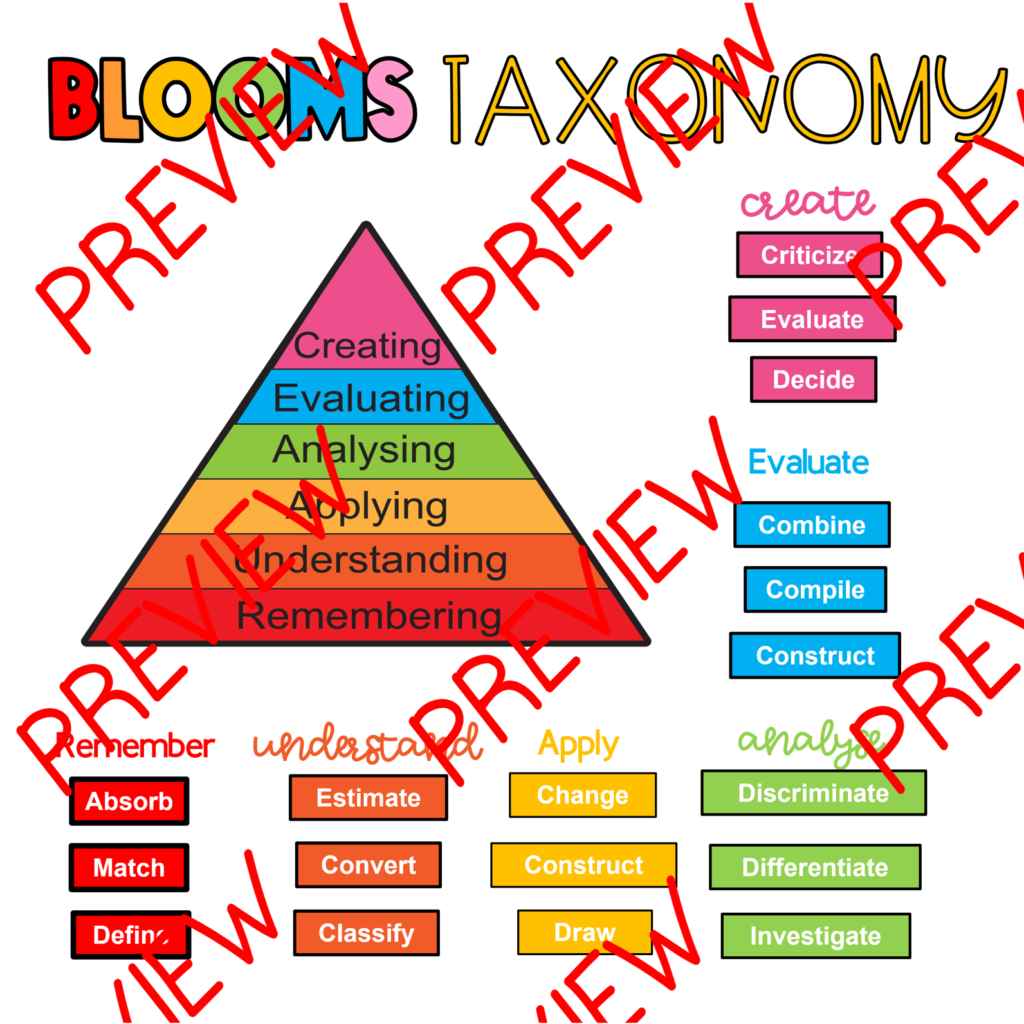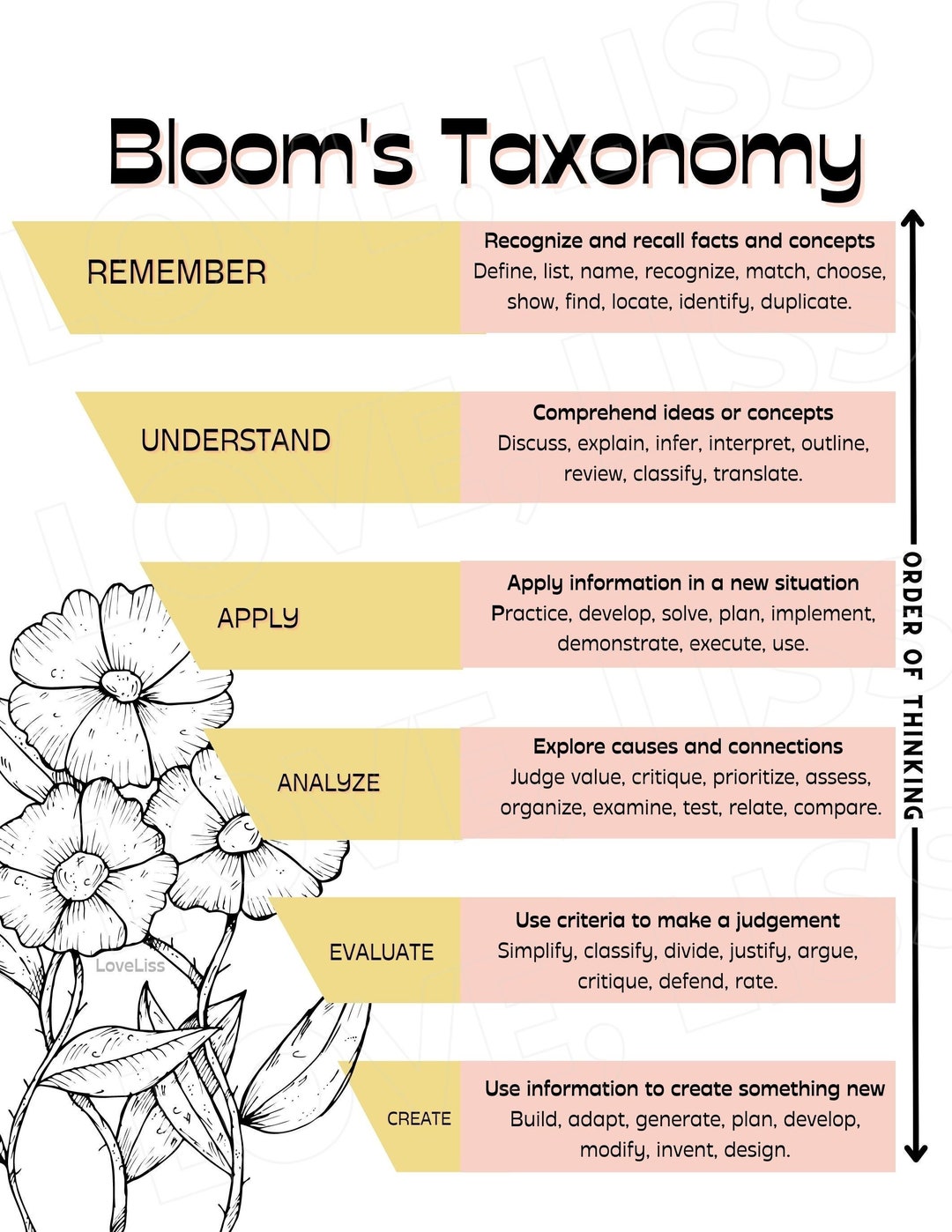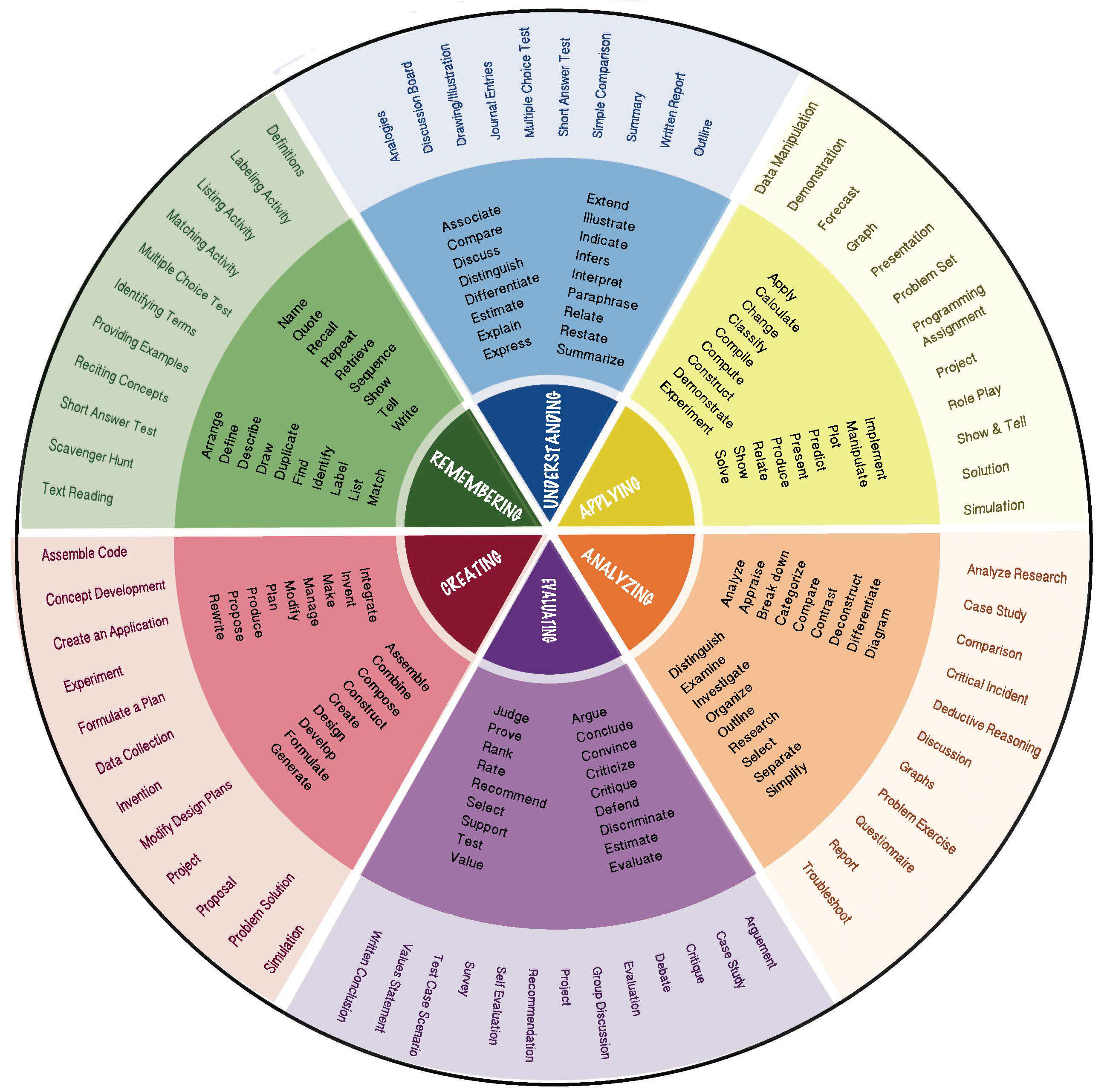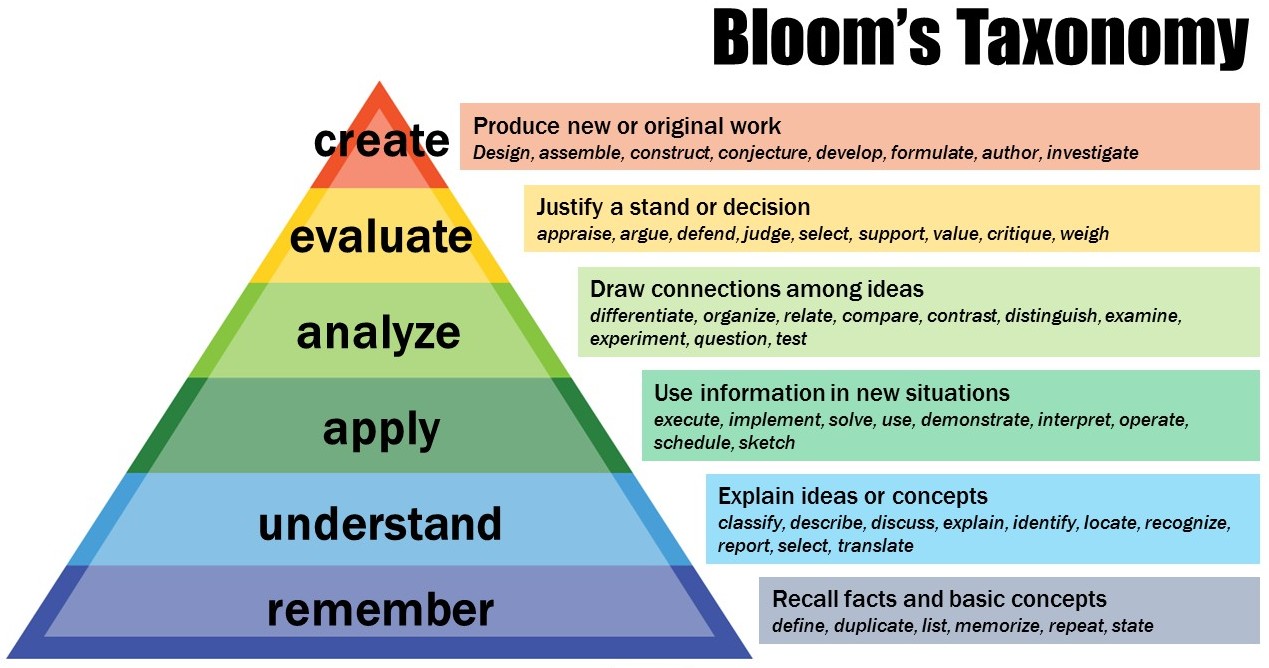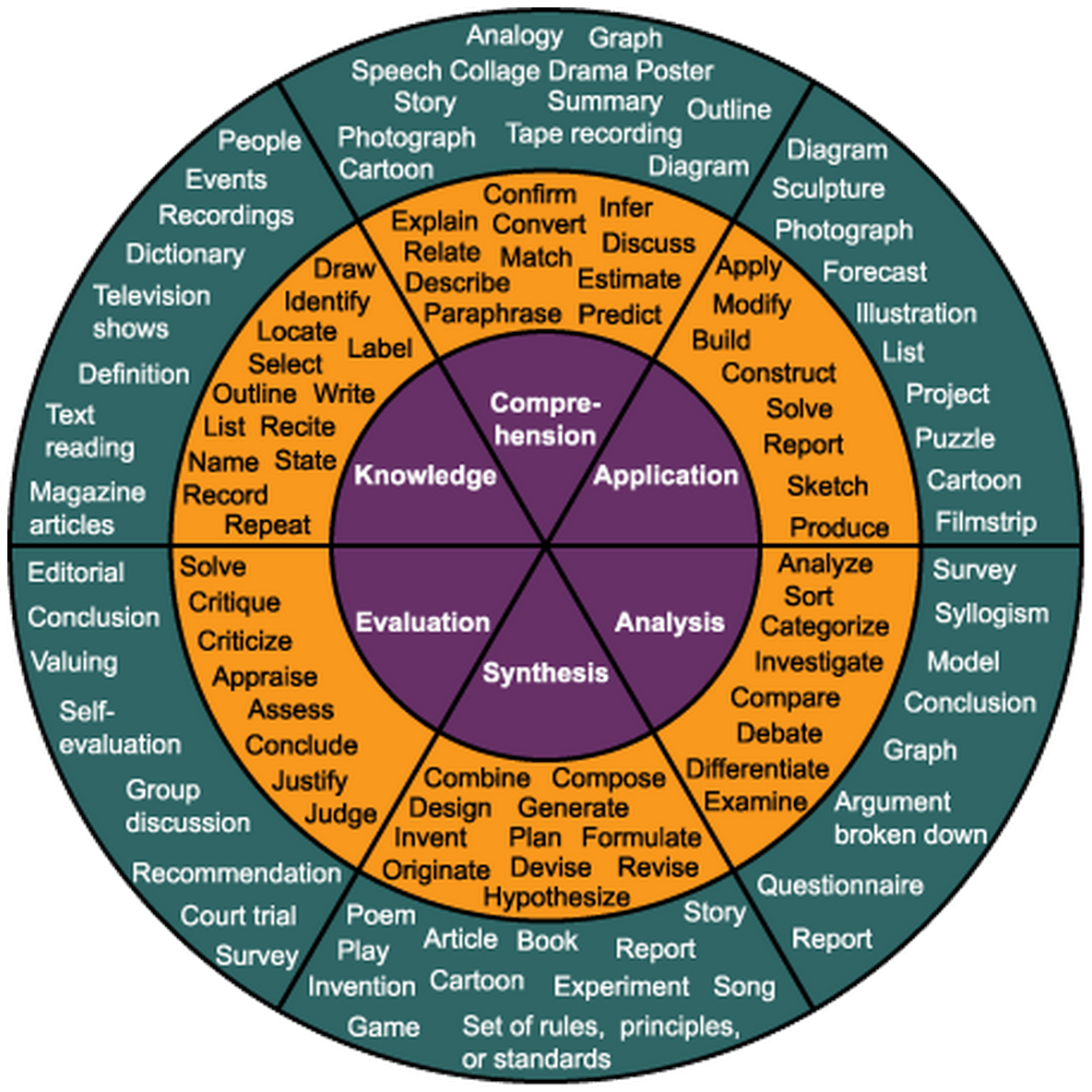Blooms Taxonomy Printable
Blooms Taxonomy Printable - Prepare a flow chart to illustrate the sequence of events. Updated the taxonomy to reflect relevance to 21st century work. Make a diorama to illustrate an important event. • bloom argued that our brain learns things stages of organizing information.in • the table shown will help you better understand how you. Examine and break information into parts by identifying motives or causes. Evaluate , judge, recommend, assess, estimate, measure. The revised taxonomy has altered categories and now includes verbs associated with each of the six aspects of cognition. Bloom’s taxonomy is a hierarchical model that outlines six categories of learning and application skills that progress from less to more complex. Bloom's taxonomy chart features a colorful pyramid concerning the way students learn critical thinking and analysis, starting with knowledge and reaching evaluation. Benjamin bloom and colleagues (1956) created the original taxonomy of the cognitive domain for categorizing level of abstraction of questions that commonly occur in educational settings. Note the change from nouns to verbs associated with each level. Updated the taxonomy to reflect relevance to 21st century work. Construct a model to demonstrate how it will work. Can you write in your own words.? Bloom’s taxonomy overview of bloom’s taxonomy: Use the chart to help formulate effective learning. Examine and break present and information into parts by identifying motives or causes. In this printable, you get: Bloom’s taxonomy can be useful for course design because the different levels can help you move students through the process of learning—from the most fundamental remembering and. The chart below arranges bloom's levels of cognitive activity from simple to complex and lists verbs that correspond to each level. The graph demonstrates the six aspects of learning, remembering, Solve problems to new situations by applying acquired knowledge, facts, techniques and rules in a different way. Solve problems to new situations by applying acquired knowledge, facts, techniques and rules in a different way. Make a diorama to illustrate an important event. Bloom's taxonomy chart features a colorful pyramid concerning the. The revised taxonomy has altered categories and now includes verbs associated with each of the six aspects of cognition. Bloom's taxonomy in 1956, benjamin bloom headed a group of educational psychologists who developed a classification of levels of intellectual behavior important in learning. Solve problems to new situations by applying acquired knowledge, facts, techniques and rules in a different way.. What do you think could have happened next.? The two graphics show the revised and original taxonomy. Updated the taxonomy to reflect relevance to 21st century work. Evaluate , judge, recommend, assess, estimate, measure. Use the chart to help formulate effective learning. Can you write a brief outline.? The revised taxonomy has altered categories and now includes verbs associated with each of the six aspects of cognition. Bloom's revised related verbs taxonomy: • bloom argued that our brain learns things stages of organizing information.in • the table shown will help you better understand how you. Defend opinions anci anc4 lustitv a course. Bloom’s taxonomy can be useful for course design because the different levels can help you move students through the process of learning—from the most fundamental remembering and. Examine and break information into parts by identifying motives or causes. Bloom’s taxonomy overview of bloom’s taxonomy: Construct a model to demonstrate how it will work. Benjamin bloom created a taxonomy of measurable. The graph demonstrates the six aspects of learning, remembering, Bloom's revised related verbs taxonomy: Examine and break information into parts by identifying motives or causes. Evaluate , judge, recommend, assess, estimate, measure. Solve problems to new situations by applying acquired knowledge, facts, techniques and rules in a different way. Updated the taxonomy to reflect relevance to 21st century work. The revised taxonomy has altered categories and now includes verbs associated with each of the six aspects of cognition. Bloom's taxonomy in 1956, benjamin bloom headed a group of educational psychologists who developed a classification of levels of intellectual behavior important in learning. Evaluate , judge, recommend, assess, estimate, measure.. The revised taxonomy has altered categories and now includes verbs associated with each of the six aspects of cognition. Note the change from nouns to verbs associated with each level. Can you write a brief outline.? Judgments about make inferences and find evidence to support generalizations. Which is true or false.? Bloom’s taxonomy overview of bloom’s taxonomy: Construct a model to demonstrate how it will work. Can you write a brief outline.? Use the chart to help formulate effective learning. Prepare a flow chart to illustrate the sequence of events. Examine and break present and information into parts by identifying motives or causes. Construct a model to demonstrate how it will work. Bloom’s taxonomy is a hierarchical model that outlines six categories of learning and application skills that progress from less to more complex. In this printable, you get: The graph demonstrates the six aspects of learning, remembering, The chart below arranges bloom's levels of cognitive activity from simple to complex and lists verbs that correspond to each level. • bloom argued that our brain learns things stages of organizing information.in • the table shown will help you better understand how you. Solve problems to new situations by applying acquired knowledge, facts, techniques and rules in a different way. Can you write a brief outline.? Which is true or false.? Examine and break information into parts by identifying motives or causes. The two graphics show the revised and original taxonomy. Can you write in your own words.? Use the chart to help formulate effective learning. Updated the taxonomy to reflect relevance to 21st century work. Evaluate , judge, recommend, assess, estimate, measure. What do you think could have happened next.? Solve problems to new situations by applying acquired knowledge, facts, techniques and rules in a different way. Judgments about make inferences and find evidence to support generalizations. Make a diorama to illustrate an important event. Construct a model to demonstrate how it will work.Blooms Taxonomy posters • Teacha!
Bloom's Taxonomy Printable Reference Etsy
Bloom's Taxonomy CPAHS Library
Printable Bloom's Taxonomy
Bloom’s Taxonomy Center for Teaching Vanderbilt University
Bloom's Taxonomy With Sample Questions
Free Printable Bloom S Taxonomy Printable Word Searches
8 Wonderful Blooms Taxonomy Posters for Teachers Educational
Printable Bloom's Taxonomy
Bloom's Taxonomy Printable Posters Editable in Canva Etsy Canada
The Old And New Bloom's Taxonomy Pyramid, A Chart That Explains Different Levels Of Bloom's Taxonomy, And A Practice Worksheet.
Bloom’s Taxonomy Can Be Useful For Course Design Because The Different Levels Can Help You Move Students Through The Process Of Learning—From The Most Fundamental Remembering And.
The Theory Is Based Upon The.
In This Printable, You Get:
Related Post:
